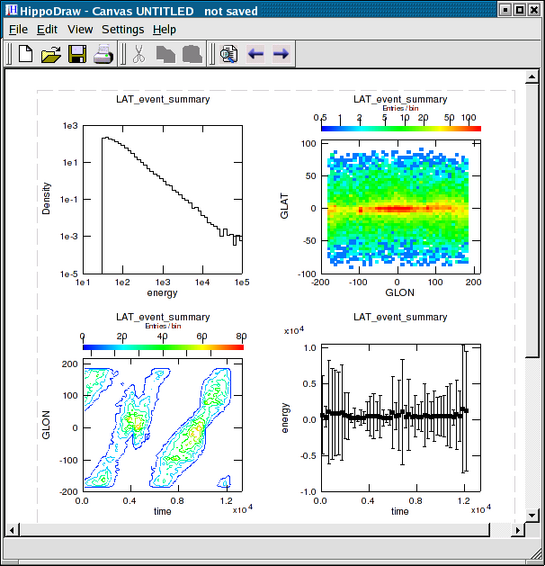
HippoDraw canvas window

HippoDraw canvas window
HippoDraw has highly interactive controls on the data plots via a dialog window called the Inspector. For example, one can change the width of the bins of a histogram via a slider and see the histogram plot re-display itself many times a second. See Inspector Users Guide and Canvas Window Users Guide for a description of the available controls.
A data source for HippoDraw is typically a NTuple, but HippoDraw supports a number of different kinds described in the DataSource page. When used as a Python extension module, Python numerical arrays are also supported. A number of visual Plot types can be made with this data. They are typically placed in Canvas Window Users Guide.
Doing easy data analysis tasks should be easy and they are with with HippoDraw's Inspector. Doing more difficult tasks should be possible. Here, one would expect to find a command line and/or scripting interface to HippoDraw. But HippoDraw does not have either. Instead one of HippoDraw's Python extension module is used. The hippo Python extension module. allows user manipulation of the data representations as if they were Python objects. This can be done either interactively, or via scripts written in Python. Changes made via Python are reflected in the Inspector and vice versa.
One can use HippoDraw's C++ library for Building custom applications in either C++ or Python. See Examples of custom applications with HippoDraw. The library consists of over 100 classes with about 50K lines of source code. The library is in two parts the core and the GUI part. With debugging symbols, they are under 10 MB and 5 MB respectively with all the optional support enabled. Without debugging symbols, they are under 1.5MB and 1MB. Both can compiled and linked in a less than 5 minutes with GCC 4.0.0 on a 2 Ghz Pentium mobile laptop. A descriptive of the library begins with HippoDraw Library Overview. A mirror of the CVS archive is browseable on the Web at this here.
Source code is available from ftp://ftp.slac.stanford.edu/users/pfkeb/hippodraw/. For Microsoft Windows users, a pre-built binary is available as a Microsoft installer file at the ftp site mentioned above. See Installation for installation instructions for Windows and Unix like systems. See HippoDraw Release Notes for changes, new features and bug fixes.
 1.4.3
1.4.3